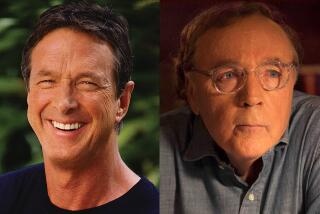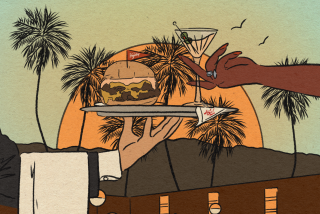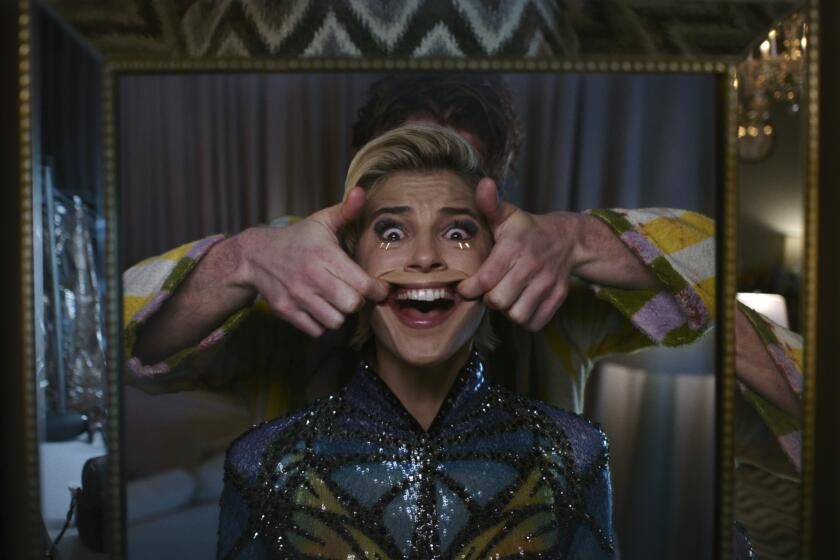‘Palm Springs’ ending explained: What really happened? And what’s up with those dinosaurs?
For the first 12 or so minutes of “Palm Springs,” you could be forgiven for thinking the film was just a slightly edgier, R-rated take on a fairly cookie-cutter romantic comedy premise: Two lost souls — sad-boy Nyles (Andy Samberg) and cynical Sarah (Cristin Milioti) — meet cute at a wedding and ... you know the rest.
But “Palm Springs,” which is now available for streaming on Hulu and playing at select drive-ins, is decidedly not that movie.
From the moment Sarah follows Nyles into a mysterious cave and becomes stuck with him in an infinite time loop, forced to relive the same day again and again, the film jumps the familiar rom-com rails and veers into “Groundhog Day”-style, genre-scrambling sci-fi-comedy. At every turn, director Max Barbakow and screenwriter Andy Siara toy with expectations and upend the usual romantic-comedy conventions, climaxing in an ending that may leave audiences wondering what exactly they just saw.
Warning: Major plot spoilers ahead. If you haven’t yet seen “Palm Springs” we suggest reading this review or interview with stars Samberg and Milioti instead. And come back when you’ve seen it.
As the film nears its end, Sarah tells Nyles she has learned of a way the two might finally break out of the endless loop — by detonating an explosion at the very moment they cross the time horizon that normally resets them back to the day’s beginning. Nyles, who has fallen in love with Sarah, is initially reluctant to go along with her plan, fearing they could end up dead or somehow eternally separated on different timelines. But ultimately he agrees to take a leap with her into the unknown, and together the two enter the cave. After Sarah affirms her own love for Nyles, they are enveloped in an explosion and the screen cuts to black.
Instead of waking up in their hotel rooms as they have for countless repeating days, Sarah and Nyles are next seen lounging in a swimming pool at a house whose owners have been out of town. The owners suddenly show up and Nyles says to Sarah, “I guess they come back Nov. 10,” suggesting it is now the day after the wedding and the two have, in fact, successfully escaped from the loop. From there, the camera pans up to show a pair of dinosaurs ambling in the distance — the same brontosauri that Sarah and Nyles saw earlier in the film.
In a brief mid-credits sequence, Roy (J.K. Simmons), who has also been stuck in the time loop, approaches Nyles at the wedding to tell him that he thinks that Sarah’s theory of how they could escape might work. But Nyles has no idea who Roy is or what he’s talking about.
So what does it all mean? Have Sarah and Nyles broken free from the time loop to live happily ever after? Or have they jumped into a different dimension in which they ultimately might end up stuck in the kind of dead-end marriage that they both fear?
Are they dead and eternally chilling in some kind of poolside afterlife? Or are there now two different Sarahs and Nyleses in two parallel timelines? And what is up with those dinosaurs?

If you were hoping for a single definitive answer from the film’s creative team, you’re out of luck. The ending was deliberately designed so that it could be viewed in different ways. How you read it will depend on personal beliefs about not just things like string theory and the possibility of alternate universes but the existence of true love itself.
“The intention was always to create an ending that was open to interpretation, where you could arrive at different conclusions about what had happened depending on how you were looking at the world, whether that was in a more optimistic or a more cynical light,” Barbakow says. “I think we all think different things happen after we pull away from that pool. That’s the fun of it. Whatever you wanted to get out of an ending, you can get out of it.”
In early versions of the script, Siara says, “it was a little more clear what maybe the main interpretation could be.” But after Samberg came on board, he and his Lonely Island producing partners, Akiva Schaffer and Jorma Taccone, helped push the film’s conclusion in a more ambiguous direction.
“We definitely talked about the ending a lot,” Samberg says. “There were many iterations written and even many iterations shot and cut together and screened for small friends-and-family screenings.”
The goal all along was to land somewhere in the space between a traditional sort of pro-love-and-marriage rom-com happy ending and a slightly darker, more open-ended one that reflects the uncertainty of any romantic venture. “It was a real push-and-pull,” Samberg says. “We didn’t want the ending to feel saccharine, like, ‘Yay, everything works out!’ That felt untrue to the tone of the movie and the promise you had made with the characters. But at the same time you don’t want to end on a note that’s bitter and depressing. It was a delicate balance.”
Along the way, Siara, like Sarah in the film, delved into some of the more speculative and exotic corners of research into the physics of space and time. “I had a nice YouTube internet spiral of looking into black holes and string theory and found some science papers on the Cauchy horizon,” Siara says. (Fun fact: The physicist with whom Sarah speaks over Skype in the film is Clifford Johnson, an actual theoretical physicist at USC who has served as a scientific consultant on a number of Marvel Studios films.)

For his part, Samberg — who has been married to singer-songwriter Joanna Newsom since 2013 — says he personally subscribes to the sunnier interpretation. “I am very happily married and there is a big part of this script that really resonated with me because of that idea of taking a big leap and that feeling that in the end it pays off,” Samberg says. “But obviously everyone is different.”
Indeed, Milioti says she feels “very differently” than Samberg about the ending, though she declines to share her own interpretation. “I’m reticent to say what I think because one of my favorite parts about it is how ambiguous it is,” she says. “They could be dead. They could be in a different realm. But it kind of doesn’t matter because they’re together.”
Siara, whose own Palm Springs wedding helped serve as the springboard for the script, agrees. “The hope is it doesn’t really matter if they get out of the loop or if they’re not out of the loop or if they’re in another dimension or whatever,” he says. “The real emotional arc of the movie ends right before they walk into the cave. Everything else after that is just fun sci-fi.”
So where do the dinosaurs fit in? Again, that’s in the eye of the beholder.
While other aspects of the script evolved over time, Siara says the dinosaurs were there from the very earliest versions and came from a personal place. “The whole reason I wanted to make movies to begin with is ‘Jurassic Park,’ ” says the screenwriter, who, along with Barbakow, is making his feature debut with the film. “So therefore, if this was the only chance I ever had to make a movie, there’d better be dinosaurs in it.”
The Los Angeles Times staff picks their favorite films from Sundance 2020, where indie gems and bold voices premiered new films.
OK, fair enough. But why would there be dinosaurs roaming the Palm Springs desert that only Sarah and Nyles seem to see? And do they really see them or are they just figments of some kind of romantic fantasy or psychedelic trip?
“To me, whether they’re real or not, it’s a nice symbol that falling in love is like seeing dinosaurs in the desert,” Barbakow says. “There’s a transcendent wonder in that. You can intellectualize it that way. But it’s also just fun, like, ‘Let’s put some dinosaurs in the movie.’ ”
In Siara’s mind, the dinosaurs are not really about literal truth but something more intangible. “Thinking about my wedding day or when I held my daughter in my arms for the first time, those are moments in life that words cannot describe — and the only way they could get better is basically if you have dinosaurs on the horizon,” he says. “It’s that feeling that we were always after.”
That feeling was more than enough for Milioti. “I remember that moment in the script really took my breath away,” she says. “I was like, ‘Oh, that’s so beautiful. That’s love.’ It’s like a God moment or something, not to put too fine a point on it. I love a little bit of magical realism.”
As Samberg sees it, the real message of that final shot of the dinosaurs in the distance is that each of us, with our own personal baggage of hopes and fears and foibles, ultimately makes our own reality.
“The thing that is so key about the dinosaurs is that Sarah and Nyles both see them,” he says. “Having them there at the ending is a nod to them seeing them earlier [at the campfire]. But it’s also a wink to the audience as well, saying, ‘Whatever you want it to be, that’s what it is.’ ”
More to Read
Only good movies
Get the Indie Focus newsletter, Mark Olsen's weekly guide to the world of cinema.
You may occasionally receive promotional content from the Los Angeles Times.











